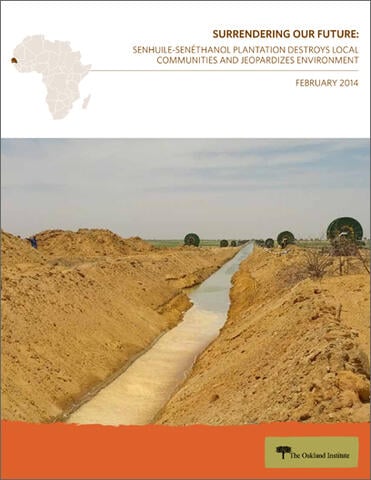Press Release: Senegal: Murky International Conglomerate Threatens Land Rights, Food Security, and Wetland Preserve
For Immediate Release
Contact: [email protected]; +1-510-512-5458
Oakland, CA: A new report released by the Oakland Institute reveals how the lives and livelihoods of more than 9,000 pastoralists and a protected ecosystem in northwestern Senegal are directly threatened by a foreign-controlled 20,000-hectare plantation. Owned by an international conglomerate with hidden investors and suspicious connections, Senhuile SA is a joint venture controlled by Italy's Tampieri Financial Group, Senegalese investors, and Agro Bioethanol International, a shell company registered in New York.
 Surrendering Our Future exposes widespread misconduct by Senhuile SA, including complete disregard for consultation and consent from local communities, lack of transparency and accountability, and the project’s devastating impact on people’s livelihoods, food security, and the environment.
Surrendering Our Future exposes widespread misconduct by Senhuile SA, including complete disregard for consultation and consent from local communities, lack of transparency and accountability, and the project’s devastating impact on people’s livelihoods, food security, and the environment.
The agro-industrial plantation was initially established in Fanaye, Senegal, where violence resulting from local opposition led to the death of two villagers and dozens of injuries in 2011. Soon after, the project was moved by presidential decree to the ecologically and culturally sensitive forest and wetland preserve of Ndiaël, which is home to 9,000 pastoralists and their 40,000 livestock. The Senhuile project is now running roughshod over the inhabitants and the environment of the Ndiaël reserve, cutting off access to grazing land, water, food, and firewood and threatening local livelihoods. Residents from the 40 villages that have relied on the reserve for decades are calling for the project to be stopped before it forces them off of their land and destroys the reserve.
“It’s bewildering that, after so much controversy in Fanaye, the government moved Senhuile’s project just 30 kilometers west without any consultation or impact assessment and no regard for established villages within the lease area,” said Oakland Institute’s Policy Director, Frederic Mousseau. “Despite claims of prioritizing food security, the Senegalese government has chosen to place more than 20,000 hectares in the hands of a foreign company to grow export crops at the expense of local food producers,” he continued.
Ardo Sow, a local community representative from Ndiaël, said, “The disdain for local communities is far too obvious. An Environmental and Social Impact Assessment was only conducted months after the start of the project, and was never made public. Moreover, the map produced by state technicians before the start of the project identified the existence of only 6 of the 40 villages and hamlets on the land leased to Senhuile.”
With some 6,000 hectares cleared and partially planted, the company has built irrigation canals that divert much-needed water from communities and fenced off the land, restricting access to grazing land, water, and firewood. Complaints of harassment, intimidation, and physical assault by the police and private guards hired by the firm abound.
The report’s release coincides with the launch of a global campaign sponsored by local Senegalese groups and international organizations, including The Collective for Ndiaël, CNCR, Action Aid, ENDA Pronat, GRAIN, and Re:Common, who are calling for an end of this land deal before it permanently destroys the communities and the environment of Ndiaël, Senegal. Read the joint press release here.
Watch video from Ndiaël (long version)
